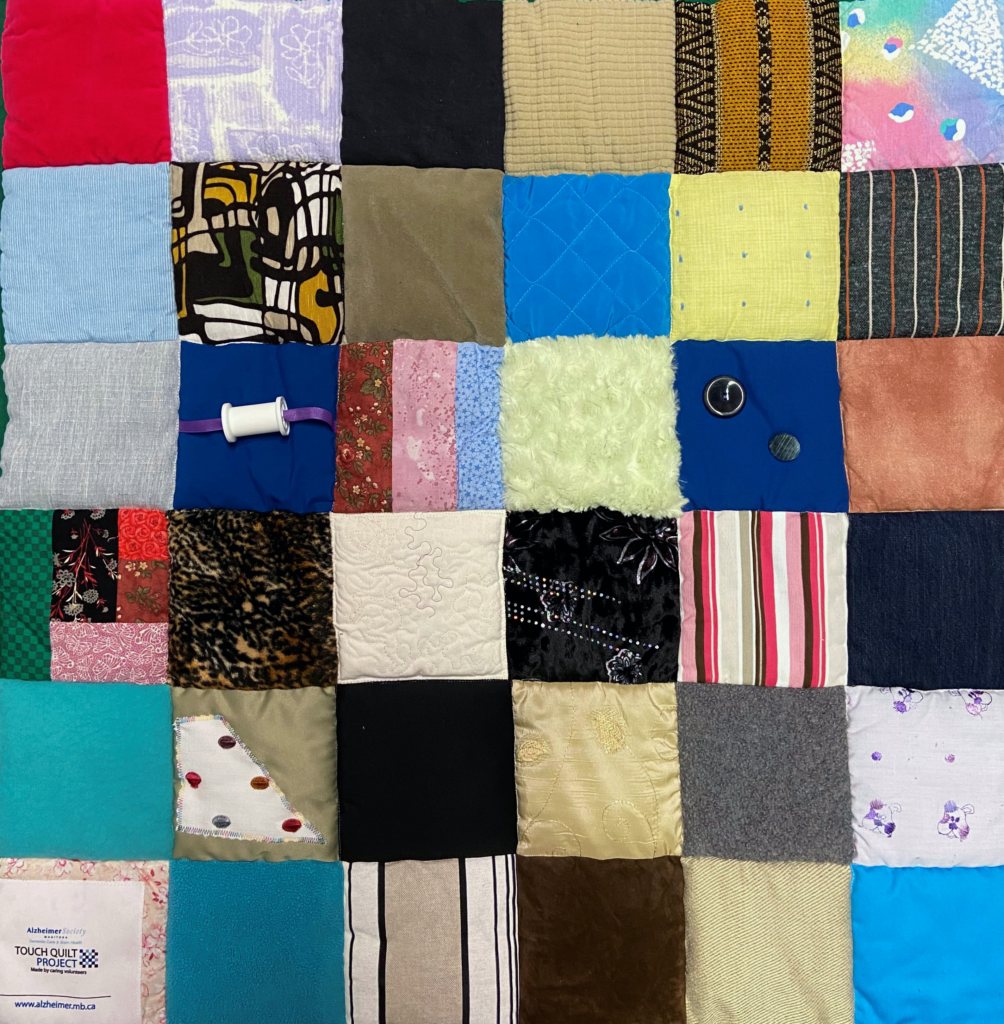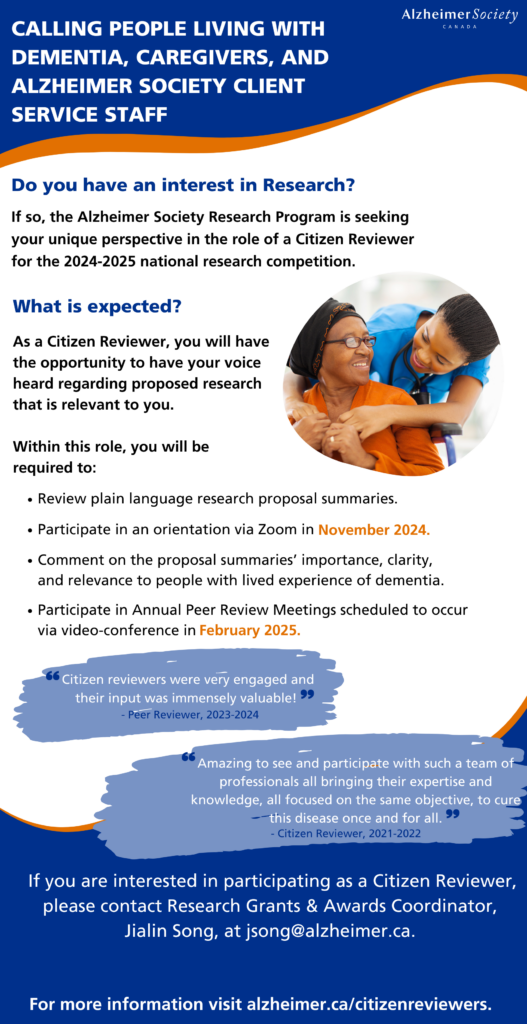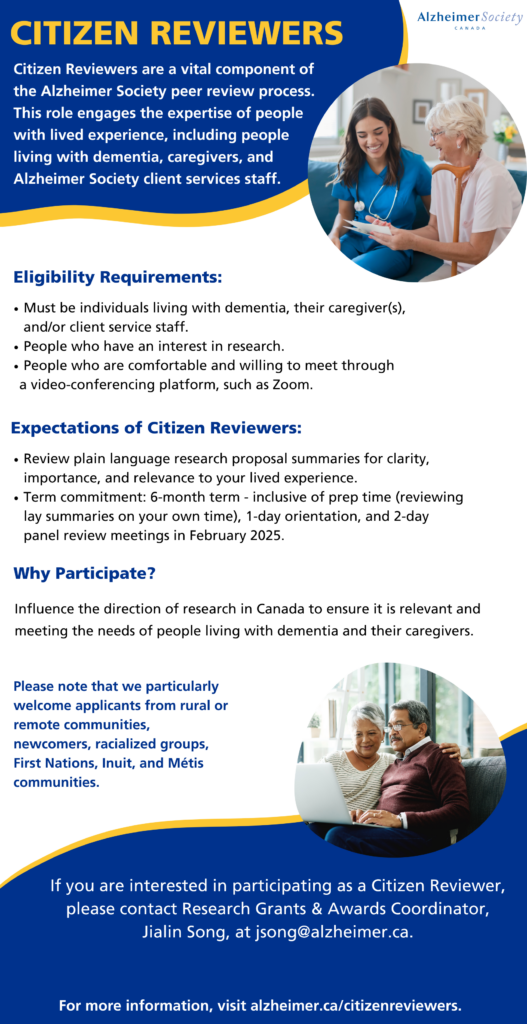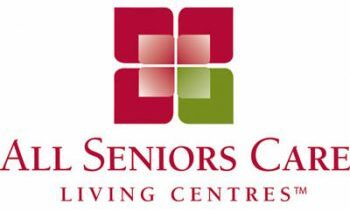Programming & Support
Connect With Us
Bringing Comfort & Enjoyment to People Living with Dementia
The Alzheimer Society’s Touch Quilt project is a community initiative that provides lap quilts to people living in personal care homes across the province. The hand-sewn quilts provide warmth and sensory stimulation, which is important for someone living with dementia because it can give them feelings of comfort and relaxation through the sense of touch.
Jo-Anne Pelzer began volunteering and sewing touch quilts around 10 to 15 years ago, after seeing an ad in her local paper for a touch quilt bee. She’s now leading the Touch Quilt project, coordinating and organizing volunteers, supplies and distribution.
“Touch quilts are also known as fidget items, so you can really get creative when sewing them,” says Jo-Anne. “Whether you add a zipper, shoelace or buttons, you can have fun with it. Different textures can bring up memories, for example, if you add lace or satin to a quilt, it may remind someone of their wedding dress, or if you add denim, it may remind someone of their farming pants.”
Jo-Anne says the Society currently has an abundance of supplies donated by families, community groups and organizations, but more volunteer sewers are needed to keep up with quilt requests.
“It’s fairly basic sewing, so you don’t need a lot of experience to make one,” Jo-Anne says. “Volunteers take home a touch quilt kit and sew at their leisure. All supplies are provided for you, including 36 quilt squares.”
Not only are touch quilts a fun project for beginner or experienced sewers, but this volunteer-led initiative also helps create awareness and education opportunities about the importance of brain health, dementia and how the Alzheimer Society can help those affected by dementia.
Since 2023, the Society has donated around 500 touch quilts to people living with dementia in personal care homes, community and other housing sites.
“The touch quilts we donate are well-used and very appreciated,” says Jo-Anne. “Families often hang on to the quilts as keepsakes as well, to remember someone living with dementia after they’ve passed.”
If you would like to volunteer by sewing a touch quilt or know someone who lives with dementia and could benefit from a touch quilt, connect with the Society at [email protected], 204-943-6622 (Winnipeg) or 1-800-378-6699(Manitoba). Quilts are available at no cost.
Thank You to the Jewish Foundation of Manitoba
 We are thankful to the Jewish Foundation of Manitoba for their generous grant to our organization. Grants and donations are so meaningful because they help us continue to sustain and grow our community of support for individuals and families affected by dementia.
We are thankful to the Jewish Foundation of Manitoba for their generous grant to our organization. Grants and donations are so meaningful because they help us continue to sustain and grow our community of support for individuals and families affected by dementia.
The funding provided by the Jewish Foundation of Manitoba went toward materials for the Touch Quilt Project and purchasing equipment for our Minds in Motion program – both will positively impact people living with dementia and their care partners.
We appreciate your generosity and support!
After-Hours Telephone Support: Every Monday & Wednesday
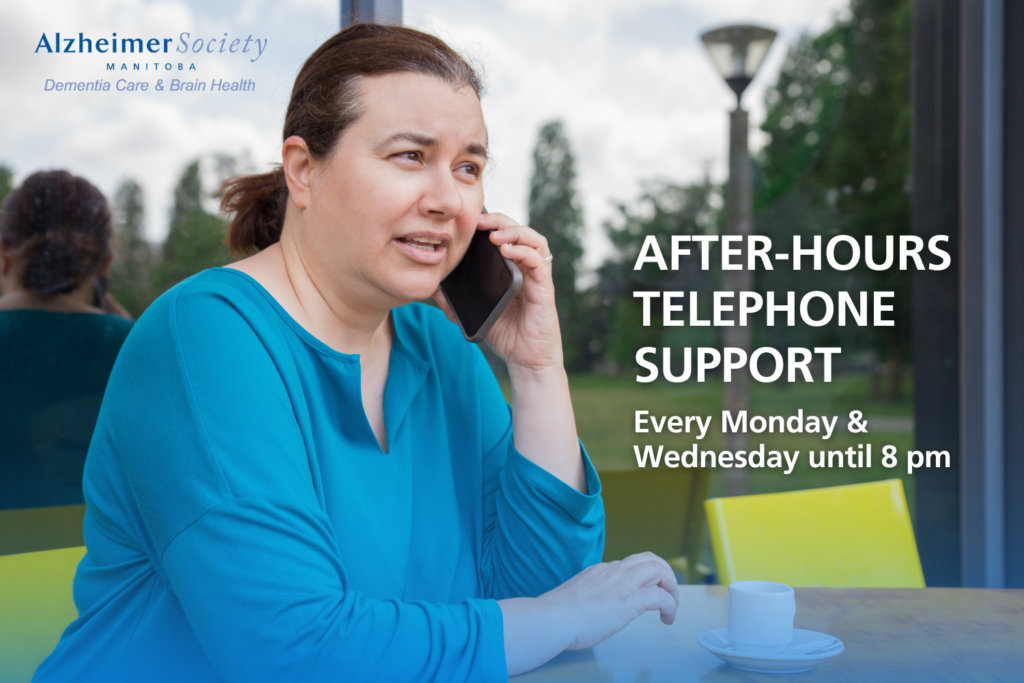 Sometimes our days can get busy with errands, appointments or work. If it’s challenging for you to call us during daytime hours, we have a new pilot project offering extended telephone support every Monday and Wednesday evening until 8 pm. Depending on the popularity of this pilot project, we may continue offering this support in the future.
Sometimes our days can get busy with errands, appointments or work. If it’s challenging for you to call us during daytime hours, we have a new pilot project offering extended telephone support every Monday and Wednesday evening until 8 pm. Depending on the popularity of this pilot project, we may continue offering this support in the future.
Our First Link® Client Support team is ready to listen and help guide you through all aspects of dementia or caregiving. We hope these extended hours help give more people an opportunity to connect with us for support, resources and information.
Give us a call at 204-943-6622 (Winnipeg) or 1-800-378-6622 (Provincial).
Fall Prevention Month
 According to the National Institute of Health (NIH), more than one in four people over the age of 65 experience a fall annually. People living with dementia are at an even higher risk of falling because of changes that occur as the disease progresses.
According to the National Institute of Health (NIH), more than one in four people over the age of 65 experience a fall annually. People living with dementia are at an even higher risk of falling because of changes that occur as the disease progresses.
November is Fall Prevention Month, a great opportunity to learn a few things you can do to make sure your home and outdoor environments are as safe as possible this winter to help reduce your risk of falls.
For people living with dementia, an increased risk of falls may be related to changes with:
- Decreased balance and reaction time
- Perception or visual problems
- Difficulty walking
- Memory impairment
- Decrease in judgment
- Less insight into environment and situations
When modifying your home environment, aim to keep things familiar, striking a balance between safety and independence.
Winter weather also comes with certain safety concerns to be aware of. Perception problems caused by dementia may make it difficult to see ice on the sidewalk or can cause someone to believe snow is a solid surface.
Below are a few actions you can take to help reduce the risk of falls inside and outside the home.
INDOORS
- Make sure each room has enough light and reduce dark areas and shadows
- Use contrasting coloured tape to highlight steps
- Place night lights throughout the home for when you need to go to the bathroom or kitchen during the night
- Use non-slippery bathmats and place non-slip strips in the bath/shower
- Install railings inside and outside the house and grab bars in the bathroom for extra support
OUTDOORS
- Keep your walkways free of ice and snow
- Take smaller steps and slow down
- Make sure you and others wear non-skid boots
- Dress in bright colours and add reflective material to clothing
Taking a few extra measures around the home and before journeying outside can help reduce the risk of falls for all, especially those living with dementia. If you have questions about home or outdoor safety, contact our First Link® Client Support team by calling 204-943-6622 (Winnipeg) or 1-800-378-6622 (Provincial), or email us at [email protected].
Join our Growing Team!
 We are currently hiring for multiple positions, including Client Support Coordinator, Communications Coordinator and Minds in Motion® Program Facilitator.
We are currently hiring for multiple positions, including Client Support Coordinator, Communications Coordinator and Minds in Motion® Program Facilitator.
If you think you’d be a good fit for any one of these positions, check out the full job postings at the following links. We invite all qualified applicants from diverse backgrounds to apply. These positions will remain open until filled.
Minds in Motion Program Facilitator
Assistant Professor’s Research Wins Funding from the Alzheimer Society
Dr. Jillian Stobart understands firsthand how dementia can impact an entire family.
An assistant professor in the College of Pharmacy at the University of Manitoba, Jillian saw both her paternal grandfather and her maternal grandmother pass away from Alzheimer’s disease.
She was very close to them both, but it was especially difficult watching her grandmother progress.
“I moved from Flin Flon to Winnipeg to attend university and lived with my grandmother,” she says. “It was very hard to see how things affected her in the long term. Now I have an aunt who is in her 60s that has also been diagnosed with dementia.”
Jillian has received funding from the 2024 Alzheimer Society Research Program (ASRP), one of Canada’s most innovative hubs for dementia research, helping the best and brightest minds pursue innovative dementia research projects.
With a PhD in pharmacology, Jillian is well-equipped to lead her dementia-related research. The study looks at ways to reduce astrocyte P2Y1 receptor signaling to slow the progression of Alzheimer’s disease.
A lot of Alzheimer’s research focuses on the neurons – the electrical circuit cells of the brain — which start to die when someone has Alzheimer’s disease, Jillian explains.
“In my research, we’re coming at it from a different direction. There are other brain cells, called astrocytes – they’re called that because under a microscope they look like tiny stars,” Jillian says.
“We thought astrocytes existed to support cells, to maybe clean up the neurons or supply them with energy. But what’s interesting is that in Alzheimer’s disease, the astrocytes change and start to work improperly. They start to increase the amount of a particular receptor called P2Y1.”
Jillian says when P2Y1 receptors increase in the astrocytes, it interferes with the function of the brain cell. “In simpler terms, it makes them sick and they can’t do the job they’re supposed to do,” she explains. “We want to try to stop this process and find a way to limit how this receptor is functioning on astrocytes.”
Her study involves genetically modifying mice so they don’t have the P2Y1 receptor. “Those mice should hopefully not get Alzheimer’s or get a less severe version of the disease,” Jillian says.
The research will increase the understanding of how the P2Y1 receptor contributes to Alzheimer’s disease which could in turn lead to the development of drugs that can block it and slow the progression of the disease.
“We wouldn’t be able to do this research without the support of the Alzheimer Society. I’m really thankful to the donors who’ve made this happen,” she says.
To learn more about the ASRP and view all of this year’s recipients, visit The Alzheimer Society Research Program / Latest funding results
Become a Citizen Reviewer for the Alzheimer Society Research Program
Do you have an interest in Research?
If so, the Alzheimer Society Research Program (ASRP) is seeking your unique perspective in the role of a Citizen Reviewer for the 2024-2025 national research competition. Citizen Reviewers are a vital component of the Alzheimer Society peer review process.
To be eligible for this role, you must:
- Be someone living with dementia or a care partner
- Be interested in research
- Be comfortable and willing to meet through a video-conferencing platform, like Zoom
If this sounds like something you’d be interested in, please contact Research Grants & Awards Coordinator, Jialin Song at [email protected].
Check out the posters below for more information!
Upcoming Community Presentations
Check out our upcoming community presentations and expand your knowledge of dementia. These sessions are free to attend and cover a range of topics!
- Understanding Dementia in Long Term Care (view poster)
Learn more about dementia, how it can impact behaviour and gather tips for visiting someone with dementia in long-term care.
Two Available Sessions: Thursday, Nov. 14 | 1:30 pm AND Tuesday, Nov. 19 | 7 pm
Tudor House Personal Care Home
800 Manitoba Ave, Selkirk, MB
To register, please contact Melanie at 204-482-6601 Ext: 141 or email [email protected] - Introduction to Dementia & Dementia-Friendly Communities
Join us to learn about some small changes you can make to make yourself and the environment around you more dementia-friendly.
Thursday, Nov. 21 | 2-3 pm
Pioney Regional Senior Services
15 Prevost St, South Junction, MB
No registration required - ABCs of Dementia (view poster)
Learn about dementia and how it impacts a person’s abilities, behaviours and communication.
Wednesday, Nov. 27, 10 – 11 am
Club Bles D’or
1254 Dawson Rd, Lorette, MB
Email [email protected] to register
Register Now for Our Free Education Sessions
 We offer free, online education sessions that help to educate and empower those living with dementia, their families, friends and care partners. These sessions cover a variety of topics and are free to attend and offered via Zoom.
We offer free, online education sessions that help to educate and empower those living with dementia, their families, friends and care partners. These sessions cover a variety of topics and are free to attend and offered via Zoom.
Click here to register for all Family Education sessions.
Here’s what’s coming up:
Medical Assistance in Dying (MAiD)
It’s important to have updated and accurate information about MAiD. This session will provide participants with details about:
• updates to the federal legislation and its implementation in Manitoba, particularly in relation to individuals with dementia
• the “what, when, who, why and how” as these questions pertain to MAiD in Manitoba
Tuesday, November 12 | 2 – 3 pm
Living with Dementia First Steps – Part 3
*Please note you do not need to attend the Living with Dementia series in order. The third session of a three-part information series for people supporting someone recently diagnosed with dementia. Learn from health and industry professionals as they discuss the disease progression and provide information on services and resources available. This webinar includes an overview of the Winnipeg Regional Health Authority (WRHA) Home Care Services.
Saturday, December 7 | 10 – 11:15 am
The Importance of Physical Activity in Care Partner Risk Reduction
Did you know that physical inactivity and stress are risk factors for dementia? Join Nicole McDonald, Senior Manager of Dementia-Friendly Communities for an education session on care partner self-care strategies including ways to stay active and reduce stress while balancing the responsibilities of caring for someone living with dementia.
Tuesday, December 10 | 10 – 11 am
You can choose to watch these online sessions in-person at the Alzheimer Society office (10-120 Donald Street, Winnipeg) – the speaker will not be presenting in-person. Please email [email protected] if you are interested in this option.
The Winter 2025 education calendar will be available in our December eNews!
Family Education programs sponsored by:
Stay Active & Have Fun in the Community
Although fall is wrapping up, there are still several opportunities available to take advantage of our seasonal programming and have some fun out in the community.
Minds in Motion
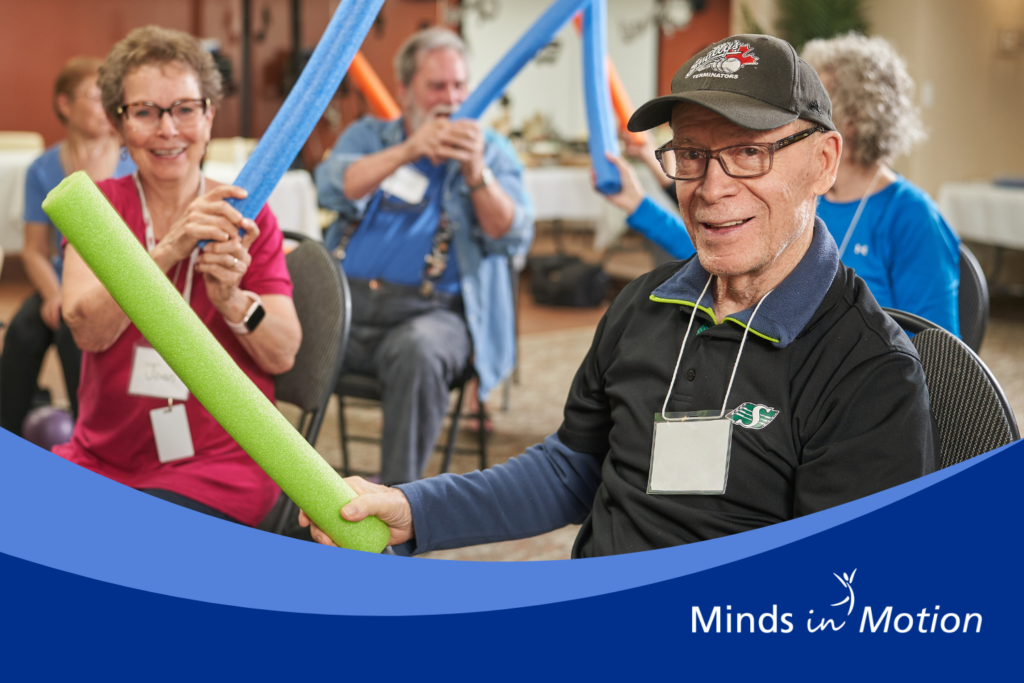 For those interested in joining our Minds in Motion program, the Wellness Institute in Winnipeg is still accepting registrants! Our popular Minds in Motion program connects people living with early to moderate signs of dementia and their care partners through fitness, fun and friendship. Participants take part in a gentle chair fitness class followed by socially engaging activity and conversation. There are lots of laughs and social interaction during these sessions.
For those interested in joining our Minds in Motion program, the Wellness Institute in Winnipeg is still accepting registrants! Our popular Minds in Motion program connects people living with early to moderate signs of dementia and their care partners through fitness, fun and friendship. Participants take part in a gentle chair fitness class followed by socially engaging activity and conversation. There are lots of laughs and social interaction during these sessions.
The Wellness Institute – 1075 Leila Ave
Wednesdays, 1:30 – 3:30 pm
Oct 16 – Dec 4
Call to register: 204-632-3900
Registration for winter Minds in Motion sessions will be available soon, so stay tuned!
Community Partner Programs
The Alzheimer Society partners with community organizations to create programs designed especially for people living with early to moderate symptoms of dementia to attend with their family members, friends or care partners.
Registration is open for these engaging programs:
Dalnavert Museum Dementia-Friendly Tours
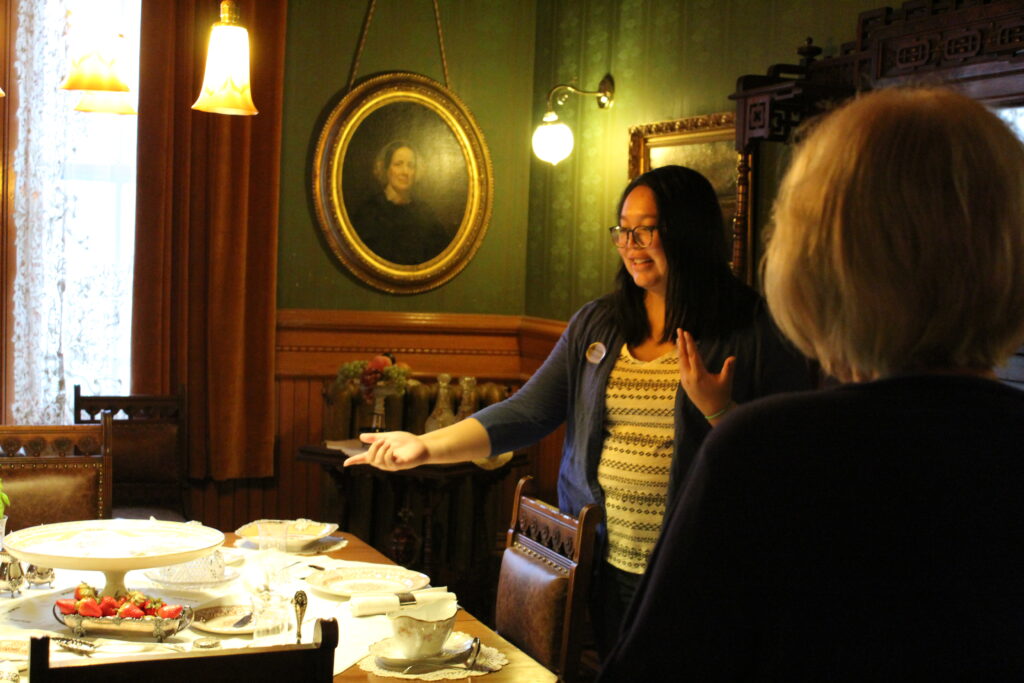 Come to the Dalnavert Museum for their monthly dementia-friendly tours. This program allows people living with early to moderate symptoms of dementia and their care partners to step back in time and explore the historic house and its collection.
Come to the Dalnavert Museum for their monthly dementia-friendly tours. This program allows people living with early to moderate symptoms of dementia and their care partners to step back in time and explore the historic house and its collection.
After your tour of the museum, join them for tea and coffee and a closer look at some artifacts.
Please note: The upper floors of the museum are only accessible by stairs. If stairs pose a barrier, there will be the option of exploring the upper floors of the house with a tour guide in the Visitors’ Centre through our virtual tour. Folding cane-seats can be borrowed free of charge during your visit and there will be seating available throughout the museum.
Monthly Program
The last Saturday of every month, 10 – 11:30 am
Cost: $24.00 (plus tax) per pair and session, $12.00 per pair and session if one of the pair is a Dalnavert Museum Member
Register today on the Dalnavert Museum and Visitors’ Centre website
Tune-Up Café (Convalescent Home of Winnipeg)
 Tune-Up Café is for individuals living with early to moderate signs of dementia and their care partners. It’s an inclusive and welcoming meeting place for singing, making social connections and sipping on a cuppa!
Tune-Up Café is for individuals living with early to moderate signs of dementia and their care partners. It’s an inclusive and welcoming meeting place for singing, making social connections and sipping on a cuppa!
Fall Program
Convalescent Home of Winnipeg, 276 Hugo St North, Winnipeg
Tuesdays, 6:15 – 8 pm
There is no fee to attend, but registration is required.
Contact Sherry at [email protected] for more information and to register.
Vivace Voices Choir (Canadian Mennonite University)
 Come and join us in making music together! Singing in a choir is a challenging and joyful experience. In this program, people living with early to moderate signs of dementia and their care partners will learn to sing new and familiar music while making connections with those around them. No prior choral experience is required.
Come and join us in making music together! Singing in a choir is a challenging and joyful experience. In this program, people living with early to moderate signs of dementia and their care partners will learn to sing new and familiar music while making connections with those around them. No prior choral experience is required.
Fall Program (10 weeks)
Canadian Mennonite University (North Campus), 500 Shaftesbury Blv.
Tuesdays, 6:30 – 7:30 pm
Oct 8 – Dec 17, 2024
Winter Program (11 weeks)
Canadian Mennonite University (North Campus), 500 Shaftesbury Blv.
Tuesdays, 6:30 – 7:30 pm
Jan 28 – April 8, 2025
Cost: $145/pair OR $280/pair for both fall 2024 & winter 2025 programs
Learn more and register now on the CMU website
Join Our Evening Care Partner Support Groups
An evening care partner support group is a great way for those with busy daytime schedules to connect with a community of individuals you can lean on for encouragement and support. When you join a support group, you will learn more about dementia and its progression, learn and exchange tips and strategies with other care partners and participate in meaningful discussions.
Whether you prefer meeting in person or virtually, there are many evening groups available to care partners. Check out the list below for evening groups currently running.
In-person Care Partner Support Groups
Winnipeg
- River Ridge II
2701 Scotia St.
Fourth Tuesday of the month, from 7 to 8:30 pm
[email protected] - The Waverley & Rosewood
857 Wilkes Ave.
Third Wednesday of the month, from 7 to 8:30 pm
[email protected]
Interlake/Eastern
- Beausejour
East-Gate Lodge Personal Care Home, 646 James St.
Second Tuesday of the month at 6:30 – 8 pm
To register, contact [email protected] - Sagkeeng Anicinabe Nation
SHC Trailer, 50017 (B) Manitoba 11
Third Wednesday of the month at 6:30 – 8 pm
[email protected] - Selkirk
Gordon Howard Centre, 384 Eveline St.
First Wednesday of the month at 7 pm
[email protected] - Stonewall
South Interlake 55 Plus Seniors Centre, 374 1st St. West
Third Tuesday of the month from 6:30 – 8 pm
[email protected]
Virtual Care Partner Support Groups
- First Monday of the month, from 7 to 8:30 pm
[email protected]
*This support group is geared towards adult children caring for a parent living with dementia.* - Third Monday of the month, from 7 to 8:30 pm
[email protected]
*This support group is geared towards spouses of a person living with dementia.* - Third Wednesday of the month, from 6:30 to 8 pm
[email protected]
Call us at 204-943-6622/1-800-378-6622 or email [email protected] to register for a support group or to discover the best group to meet your needs.
For a complete listing of support groups, visit the links below:
Support Groups for Care Partners
Support Groups for People Living with Dementia
We welcome everyone to this inclusive environment for people of different ethnicities, cultures or persons who identify as part of the 2SLGBTQ+ community.
Follow Us On Social Media
Join us on Facebook, Instagram, LinkedIn and X (formerly Twitter) for the most current news, information and resources. If you’re already following us on social media, invite your friends to do the same!
X (formerly Twitter)
We Rely on Your Donations to Continue Our Work

Your gifts are put to immediate use through our First Link Client Support team, support groups and education programs.
Remember. You Are Not Alone.
Are you struggling to figure out your next steps? Our First Link® Client Support team is here to listen and help guide you through difficult times – from when you are concerned about your own, a family member or a friend’s memory, right through to the later symptoms of dementia. Call us today at 204-943-6622 (Wpg) / 1-800-378-6622 (MB), email [email protected] or fill out our online form and we will reach out to you.


